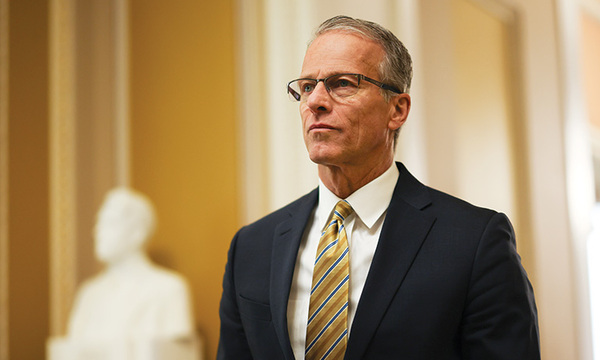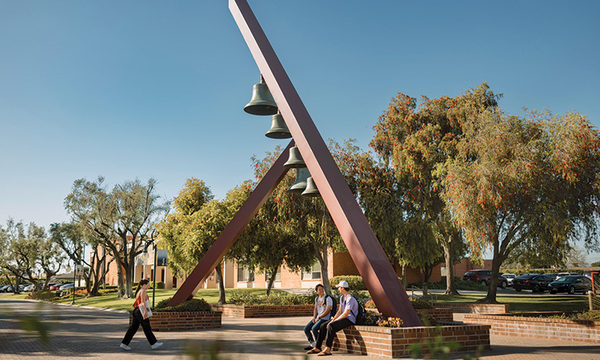If your job is taking a toll on your mental and physical health, you’re not alone.
About half of American workers say they feel burned out by work — an experience that often takes the form of exhaustion, cynicism and withdrawal (or “quiet quitting”) — according to separate 2024 surveys from the Society for Human Resource Management and the National Alliance on Mental Illness.
Christians aren’t immune to the trend. In fact, those who see their work as a calling from God may actually be more prone to burnout — and more disoriented by the sense of shame that can come with it, says Biola professor Dr. Arianna Molloy. A scholar of organizational communication and meaningful work, Molloy explores these challenges in her new book, , offering practical wisdom for cultivating long-term fulfillment. She recently sat down with Biola Magazine for a conversation that has been edited for length and clarity.
What are some of the signs that I’m experiencing burnout — versus normal stress or frustration at work?
I love that you started with stress, because chronic stress is the genesis of burnout. People often think, where did my burnout come from? It doesn’t happen overnight. It happens over a period of time. Seasonal stress comes with things like a wedding, remodeling your kitchen, a project deadline — things where there’s an end date. But chronic stress is where you begin to normalize that survival mode as just the way to live. Burnout can look like a lot of things. It can look like psychological paralysis, where you just don’t have it in you to really do anything. You can’t focus. There’s a combination of cynicism, apathy and a general resentment toward everything, but also exhaustion that is just tangible. It can lead to greater sick days. It can lead to all sorts of relational disruption. And it all can be summed up with “I don’t like what I’m doing anymore.” And because we are purpose-making creatures, to feel purposeless is really awful. Burnout is awful. Now, toxic burnout, which is burnout from a calling, is that plus some more things.
What are some of the common causes of burnout, especially in the workplace?
It’s a collection of things and that’s partly why it’s hard to see. It’s hard to notice until you’re already feeling it. Common causes are feeling overworked and undervalued, not feeling seen or heard. Or feeling “job creep,” where you’re saying yes to more things that go outside of the job description, because if you say no, you’re seen as not being a team player. It can also result from a climate of stress when organizations go through organizational change — which is inevitable, whether because they’re being innovative or they’re responding to other socioeconomic pressures. But the thing about work and life is that they’re not separate. So, in addition to work dynamics causing burnout, life dynamics can cause burnout at work, because our personal life impacts our professional life and vice versa.
You mentioned “toxic burnout,” which is burnout from a calling. It was interesting to read in your book that Christians — maybe especially Christians with a high sense of calling — can be particularly susceptible to burnout. Can you explain that?
Sure, and it might feel initially counterintuitive, but once we unpack the concept of calling it makes a lot of sense. At the very beginning, we have to remember that calling is about relationship. Calling is just the channel in which we experience relationship with (1) the Caller, which is God, (2) with ourselves and (3) with our community. If calling is about relationship, and I begin to feel burned out, it’s not just that I don’t like what I’m doing, it’s that I don’t know who I am anymore. If work once felt like a worshipful endeavor — where you felt that sweet spot of your God-given skills and passions making a difference in the lives of others — and now you don’t have it in you to do that anymore, you can experience all the symptoms of regular burnout, plus what psychologists call “deep shame.”
We can get so invested in work that feels meaningful to us that it becomes harder for us to say no or to put up healthy boundaries, because it’s not just “no” for ourselves. It’s not just “no” to this job I like. It’s “I see a need.” With toxic burnout, I can feel the need, but I don’t have it in me anymore. And it’s not a topical “I don’t want to”; it’s a deep soul “I don’t have that connection anymore.”
Can you help to draw out the distinction between a career and a calling?
There are three primary ways to approach work and they’re not distinct. So on one particular day, you and I could have all three happen. But generally one leads the experience. First, we can approach work like a job, where you do the work to get the paycheck and you live for the weekend. In this area of approaching work, you’re not necessarily using your major or your qualifications. You’re doing the job to pay the bills — which is no small thing. Many of us have been there and that’s a real thing. But it doesn’t promise upward mobility and growth. It’s just the job you do. There are positives to that, because you can leave it at work. But the negative is that because we’re hardwired for purpose, there’s a loss of motivation and satisfaction.
The second is career. Career is where there’s an extrinsic reward. You’re using your skill set, you’re using your passion, you’re using your your your qualifications, but what feels rewarding is the external — a new office, a greater paycheck, the ability to take your family on vacation, to buy your first car, to pay off your student loans, all of those things. What’s motivating is seeing this tangible “I did this thing.” And there is a promise of growth and movement.
Now, calling is different. Calling is where there’s an intrinsic motivation. You might not see the actual impact of what you’re doing, but you know you’re making a difference.
Calling in the workplace is framed in four particular ways. First, you identify it as feeling meaningful. It’s purposeful. [Think about] something as simple as turning the light switch on and off. For someone else, that may just feel functional. But when you turn the light on, you’re helping people see. Meaningful work is subjective. You can talk to a variety of people in all different spheres of life — custodial staff, CEOs, stay-at-home parents, artists, athletes, lawyers — and they’ll all experience meaningfulness differently.
The second is identifying a caller. Even people who are not Christians identify something. It could be the universe. It could be their internal self. I interviewed a musician who felt like his guitar was his caller. But there’s a sense that you’re responding to something.
The third thing is the combination of passion and skill set. Here, you have to have the combination because it definitely feels good to be good at something — to be the person that people can rely on. At the end of the day, though, just to be good at something is not enough long-term. And to only have passion for something, but not get development, apprenticeship, growth and equipping — that also is not long-term motivating. One CEO that I interviewed one time said, “Passion alone is not enough. Passion makes you a great fan. Passion and skill set makes you a great employee.”
The last [element of a calling] is that you make a positive impact on community. And here’s the linchpin: It’s not a hobby. You can experience those three other things and it’s a hobby. With a calling, our hearts feel the need. We can make a difference.
Should Christians expect our work to feel like a meaningful calling? Are there seasons or situations where I just have to bear down and do a job?
I love that you asked that question. [It’s helpful to recognize] the difference between a primary calling and a secondary calling. Our primary calling as Christians is to love God and to love others. In everything we do, we do it as if we’re doing it for the Lord. So there’s an element of being a light, being salt, in whatever we do. But that only looks at the sovereignty of God. It doesn’t take into account the artistic nature of God, the personal nature of God. He’s designed and equipped us with specific skill sets and passions for a secondary calling. Some of those we can easily use in the workplace. Others are done more in interpersonal settings.
There are many people where, just seasonally, what you need to do is pay the bills. That is real. Sometimes you experience the primary calling in the pay-the-bill job, and that’s satisfying. Not everyone is going to experience that secondary feeling of calling in paid work. But generally speaking, there’s another place in your life where you can experience that secondary calling. It might not be in paid work. It could be in a side gig. It could be in unpaid work. It could be in relationships.
For folks who are going through difficult seasons at work, how would you encourage them to pray or to seek God in the midst of that? Are there practices or spiritual disciplines that you would encourage them to engage in?
First, I would just say I’m sorry that’s happening. It’s a terrible feeling. I think the first thing to do is figure out what you have control over and what you don’t have control over — because the stuff you don’t have control over is going to just be there for a while. The Lord may be able to move things around, but you might not have control over that. So, the first step is to figure out what you actually have the agency to change.
The other thing I would say is to seek humility. Humility really is the compass to a healthy calling, and part of humility is knowing how to slow down and take a break. Practice Sabbath. Sabbath is a relational act. Sabbath, as John Mark Comer often talks about, is taking a break from the worries, the wants and the work that often occupy our mind. The only way to change is to have time to reflect on what needs to be changed, and the only way to have time to reflect is to take a Sabbath.
Now, many of us are in seasons of life where we can’t physically rest — like if you have a young kid at home, or you’re working a second job, or you’re a caregiver of some kind. It’s not always about physical rest, but it’s about mental, emotional and spiritual rest, saying, “Today, I’m not going to try to problem-solve this. Today, when it comes to mind, I’m going to offer it up to the Lord in prayer and worry about it tomorrow.” So, I would say, figure out what you have control over. Also, make sure that you’re resting, because rest is part of a healthy work life.
What has been helpful for you personally in pursuing a healthy sense of calling in your work?
One of the helpful things for me is instead of looking at burnout as a category — like “Am I burned out or not?” — is to think about it more like a spectrum. On one side you’ve got healthy calling, healthy communication, healthy living, which can be experienced in a variety of different ways. And on the other side, you’ve got burnout, and beyond that is toxic burnout. At least once a week, if not more, I’ll try to figure out where would I place myself on that spectrum and why would I place myself in that position. If I’m going a little too far on this side, what needs to happen? If calling is about relationships, my first thought is: What part of that relationship is not thriving? Is it my relationship with myself? Am I ignoring the needs that I have? Is it my relationship with God? Have I not been spending quality time with him in a way that feeds my soul? Is it my relationship with my community? Am I doing something out of scarcity or trying to please other people versus what is healthy?
That’s a really good place to start. The second is to recognize the virtue of humility in action. When you break it down, the virtues of humility really help us pursue a healthy calling. Micah 6:8 is very clear. How are we to walk with God? Walk with him humbly.
You’ve done some research on that — the relationship between humility and thriving in the workplace. What does the research reveal?
As I’ve researched how people who experience healthy calling describe their way of living, it actually overlays perfectly with scholarly research about humility. The virtues of humility can be boiled down to three main things. The first is that there’s an awareness of what you’re good at and what you’re not good at — and you’re not distracted by either one. We often confuse humility with modesty, but a modest person is not necessarily aware of what they’re good at. And in the workplace, that’s actually really unhelpful. You don’t want to work with someone who’s not aware of their strengths.
The second one is a lifestyle of learning: Am I unwilling to learn? Am I resistant to seeing that someone else might have something to teach me? Can I offer someone else an opportunity and maybe they could do it in a different way?
The third part of humility is the ability to step away. Jesus did that in his Sabbathing and even surrendering to God the Father, saying, “Not my will, but your will.” As Jim Collins talks about in his book Good to Great, a good leader can inspire people, but if they walk away, everything falls apart. But a great leader can inspire people and delegate; there’s role clarity and trust, so that if they take a pause, things still run pretty smoothly. Part of humility is saying, I can’t do this all day long every day. I’m not a machine. I’m actually meant to do what God called holy, which is to rest. Things aren’t going to fall apart, because I’m not God.
For any bosses or supervisors out there, what tips would you give them to cultivate healthy calling among their employees?
Two important things: First, develop a culture of listening. That’s going to require distinct times of slowing down. In workplaces things move fast. There are deadlines. There are financial outcomes. But there have to be designated times of listening, and listening looks different depending on the person. It’s not just an open-door policy. It’s finding at least three different ways to get people to have their voice heard. People need anonymous options if they’re afraid. They need one-on-one options if they do better that way. And they might even need a spokesperson or someone who represents a group to speak on their behalf. The second thing — and this might seem obvious — is that how you live your life as a leader models how other people should live their lives. That means we need to figure out our time boundaries. I do not ever welcome the phrase “workaholism” as a compliment. It’s an addiction. Let’s stop treating it like anything else.
You meet all the time with students who are looking for career and life advice. What advice do you give them as they’re trying to figure out what their calling is? And how about somebody who’s mid-career?
One of the mistakes about this pursuit of calling is forgetting that it’s about relationships. The second is thinking that no other jobs matter before I get to the job that feels like a calling. That’s not true at all. In order to get to the job that we can feel called to, we need to be equipped. We need experience. We need training. We need apprenticeships. So, what I often tell students is to get those first job foundations. Find a company whose culture you admire. Find a position within an organization that will offer you some skill set training. You might have two to five of those before finding that job that feels like your calling. People don’t typically find that “calling job” until their late 20s, early 30s. But to get there, you need experience. I don’t believe that God wastes anything. So even in work that ends up being something you don’t like, you’ve learned something about yourself.
I would also say in mid-career, calling is about relationships — and relationships change. There is nothing wrong with realizing the job that once felt like a calling no longer does because you might have also changed. And absolutely, there are seasonal callings — not our primary calling, which is to love God and love others — but there are seasonal callings. You may recognize that in midlife and need to find the courage to do a little exploration. A first step is to figure out who you want on an informal “advisory board.” Think of three to five people. They don’t need to all meet together. But three to five people who are doing something that you admire — it could be their approach to work, their approach to family, their approach to their faith with God — and then ask to meet with one of them at least once a month. Ask them for advice about the pursuit of your own life and development. At the end of the day, I don’t think we can thrive in any part of our life without community.
About the Expert
Arianna Molloy, associate professor of organizational communication in Biola’s School of Fine Arts and Communication, is the author of (IVP, January 2025). She has a Ph.D. in communication studies from the University of Denver. Learn more and find helpful tips on healthy communication and calling at .
Illustration by Jesús Sotés Vicente
 Ŕ¶Ý®ĘÓƵ
Ŕ¶Ý®ĘÓƵ




